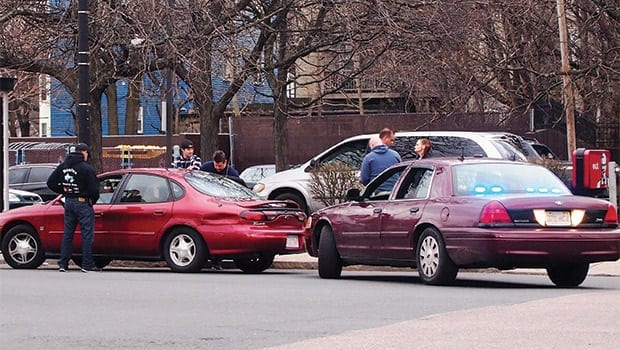
After 16 months of advocacy and a lawsuit filed by the American Civil Liberties Union of Massachusetts, the Boston Police Department last week released five years of data from its Field Intelligence Observation database showing persistent disparities between the rates at which blacks and whites are stopped, observed, questioned and searched by police.
Additionally, entries in the database raise troubling questions about whether Boston police officers are violating Fourth Amendment rights against unlawful search and seizure. In more than 70 percent of the database entries, officers listed their reason for stopping people as “investigate a person.”
Under U.S. law, police officers cannot detain suspects for questioning against their will unless they can cite what’s called a reasonable suspicion that that person has committed or is about to commit a crime.
Police officers are either not complying with their own departmental rules by failing to document why they stopped suspects or they are blatantly violating Fourth Amendment rights, says Carlton Williams, a staff attorney at the ACLU of Massachusetts.

Author: Image courtesy ACLUM websiteEntries in FIO database: A sampling of entries shows the preponderance of police encounters with “Investigate, Person” listed as the reason for the stop. Line 47 (5th from top) shows a non-consensual search of a person without probable cause for arrest.
“Investigate a person is circular logic,” he said. “It’s like saying I stopped someone because I stopped someone.”
Perhaps more troubling: In numerous instances, officers reported non-consensual searches without probable cause to arrest. Under U.S. law, officers may pat down suspects if they suspect them of committing a crime. But searches are subject to the higher standard of probable cause, which means officers intend to arrest a suspect caught in a criminal act.
The entries give credence to Boston teens’ complaints that police officers routinely search their pockets and backpacks without consent.
“It happens every day,” said Armani White, an organizer with Youth Against Mass Incarceration. “If you sit in a room with 15 young people and ask them if they’ve been searched, it’s happened to five of them.”
White said many youth are cognizant of their rights against illegal search and seizure, but still end up with officers rifling through their bags and pockets.
“People say, ‘You can’t do this,’” he said. “They still get searched.”
While blacks make up about 24 percent of Boston’s population, they represented the majority — 58 percent — of the entries in the department’s FIO database. Police Department officials have argued that most of the stops take place in neighborhoods where crime and gun violence is most abundant.
Black community residents have long argued that blacks are stopped, questioned and searched, regardless of their involvement in criminal activity.
Williams said the data released last week shows little to no improvement over the 2007-2010 data, which was compiled during the administration of former Mayor Thomas Menino when the department was run by former Commissioner Ed Davis.
“These data show enormous and consistent racial disparities,” Williams said. “The BPD said 58.5 percent of its entries are from African Americans even though less than a quarter of Boston is black. Even the BPD concedes that the disparities haven’t improved.”






